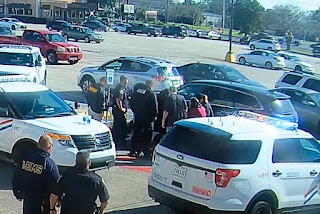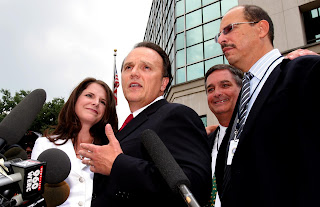 |
| Alabama's All-White Supreme Court |
Alabama, with a population that is 26 percent Black, has appellate courts that consist of justices who are 100 percent White. If that smells funny to you, it might be because you are one of those "forward-thinking people," who draw suspicious glances from the all-White arbiters of justice filling Alabama's high courts. After all, they seem just fine with things the way they are, given their apparent distaste for a new bar exam that might actually enhance diversity and inclusion in the legal profession. One of their number has openly stated his opposition to the new exam before a nationwide audience, and the others (by their silence) seem to agree with him.
Donald Watkins, an online journalist and longtime Alabama attorney and businessman (who is Black), points out a largely forgotten part of the bar-exam story in his home state and surrounding states. Bar exams started as a form of resistance to desegregation of law schools across the South. In short, bar exams came into being when Blacks, Hispanics, Native-Americans, Asians, and other under-represented groups began to enter law schools across the South. Is it possible the all-White justices in Alabama remember segregated law schools as a sign of the "good old days" in their profession. In an editorial opinion at his Web site, DonaldWatkins.com, Watkins notes that one White Alabama justice seems to yearn for the days when bar exams were used to help keep "undesirables" out of the legal profession.This justice already has announced his opposition to a new bar exam that might help make the field more diverse and inclusive.
Is this approach both shameless and short-sighted? Watkins addresses that question in a post titled "All-White Alabama Supreme Court Resists New Bar Exam That Promotes Diversity, Equity, and Inclusion." Watkins writes:
Alabama Supreme Court Justice Jay Mitchell wrote an editorial opinion which was published in The Wall Street Journal (WSJ) on May 19, 2023, that blasted a new Bar exam (NextGen) developed by the National Conference of Bar Examiners. The new exam is scheduled to roll out across the nation in 2026.
Ostensibly, Justice Mitchell’s views represent those of his brethren and sisters on the all-white Alabama Supreme Court, since none of them has publicly distanced themselves from his anti-black editorial rant about the new NextGen Bar exam.
 |
| Justice Jay Mitchell |
Justice Mitchell claimed the new Bar exam will put “considerable emphasis on examinees’ race, sex, gender identity, nationality and other identity-based characteristics.”
Mitchell, who possesses no academic or professional expertise in the psychometric principles involved in the construction, small-scale feasibility trials, content validation, large-scale testing, and cut-score algorithms for standardized tests, asserted that “[t]he idea seems to be that any differences in group outcomes must be eliminated—even if the only way to achieve this goal is to water down the test.”
Interestingly, Justice Mitchell has never felt compelled to speak out against the all-white makeup of the 9-member Alabama Supreme Court, the 5-member Alabama Court of Civil Appeals, or the 5-member Alabama Court of Criminal Appeals in a state that is 26% black. Mitchell is apparently very comfortable in this all-white appellate court paradigm.
Mitchell also whitewashes an ugly part of Alabama's history with legal education. Writes Watkins:
Justice Mitchell, a member of the ultra-conservative Federalist Society, seems to be obsessed with the possibility that greater numbers of black lawyers might be admitted to the Alabama Bar Association under the new Bar exams, which he wants to delay by 5 to 10 years.
Nowhere in his WSJ editorial does Justice Mitchell acknowledge the fact that the state of Alabama operated with no Bar exam, whatsoever, for graduates of the University of Alabama’s law school until 1965.
White University of Alabama law school students (and white graduates from other accredited law schools) were admitted to the Alabama Bar Association under a “diploma privilege” upon their graduation from law school, pursuant to Title 46, § 26, Alabama Code (1940).
Title 46, § 26, was amended in 1961 so that the "diploma privilege" would ".... apply only to graduates of the law department of the University of Alabama who, having been students there on or before August 31, 1961, graduate therefrom on or before August 31, 1965, and to no others." Title 46, § 26, Code 1940 (1973 Supp.).
Of course, the University of Alabama was all-white until Vivian Malone and James Hood desegregated the undergraduate school under National Guard protection in 1963. The University's law school was desegregated in 1969.
In essence, the "diploma" privilege was a form of white privilege -- and one of its beneficiaries went on to become a powerful U.S. senator, writes Watkins:
One of the University’s best known “diploma privilege” graduates is former U.S. Senator Richard Shelby, who received his undergraduate degree in 1957 and law degree in 1963 from the all-white University of Alabama in Tuscaloosa. After graduating from law school, Shelby lived and worked in Tuscaloosa as a prosecutor for the city (from 1963 to 1971) and a U.S. magistrate for the Northern District of Alabama (from 1966 to 1971).
In his law-enforcement capacities, Shelby was a direct and willing participant in the FBI's COINTELPRO program in the Northern District of Alabama. Between 1963 and 1971, Shelby aggressively used his law-enforcement positions to railroad thousands of blacks in judicial proceedings conducted by all-white, like-minded trial judges in Tuscaloosa city's and the Northern District's criminal-justice systems.
The history of bar exams in the South is filled with racial animus, Watkins states:
When blacks, Hispanic-Americans, Native-Americans, Asians, and other underprivileged minority students began attending law schools across the South, resistance to the desegregation of these all-white law schools arose. Alabama and other Southern states began eliminating the “diploma privilege” and imposing a “bar exam.”
As stated by the Speaker of the South Carolina Senate, the purpose of the bar examination was “to bar Negroes and undesirable whites” from becoming lawyers. The “bar exam” became a means to ensure racial disparity.
It is painfully apparent that the drum major of the new movement “to bar Negroes and undesirable whites” from becoming lawyers in Alabama is Justice Jay Mitchell, who was elected to the Alabama Supreme Court in 2018.
Before serving on the Supreme Court, Justice Mitchell was an attorney with Maynard, Cooper & Gale (now Maynard Nexsen). He has never been known as a champion of diversity, equity, and inclusion.
Justice Mitchell was born in Mobile, the hometown of former U.S. Attorney General Jeff Sessions. He grew up in South Alabama and in Homewood.
Mitchell received his Bachelor of Arts with honors from Birmingham-Southern College, where he graduated Phi Beta Kappa and served as president of the student body.
Ironically, the city of Birmingham, which is 69% black, is presently considering a $5 million loan to bailout a financially destitute Birmingham-Southern College so that it can produce more state government leaders like Jay Mitchell and his band of Federalists.
Justice Mitchell holds a Master of Arts from University College in Dublin, Ireland, and received his law degree from the University of Virginia School of Law.
Jay Mitchell hardly is alone in supporting a backward-looking approach to legal education. Writes Watkins:
Ironically, no official of the Alabama Bar Association or the Alabama Lawyers Association has distanced himself/herself from Justice Mitchell's racist commentary. Likewise, neither organization has challenged the all-white makeup of Alabama's appellate court system.
Justice Jay Mitchell epitomes the renaissance of an all-white Alabama state government, once again. His WSJ editorial says out loud what his colleagues on the Supreme Court bench say in private conversations.
Alabama has returned to the “Good Ol’ Days” of the White Citizens Council (now known as the state Republican Party) and an all-white appellate court system.





